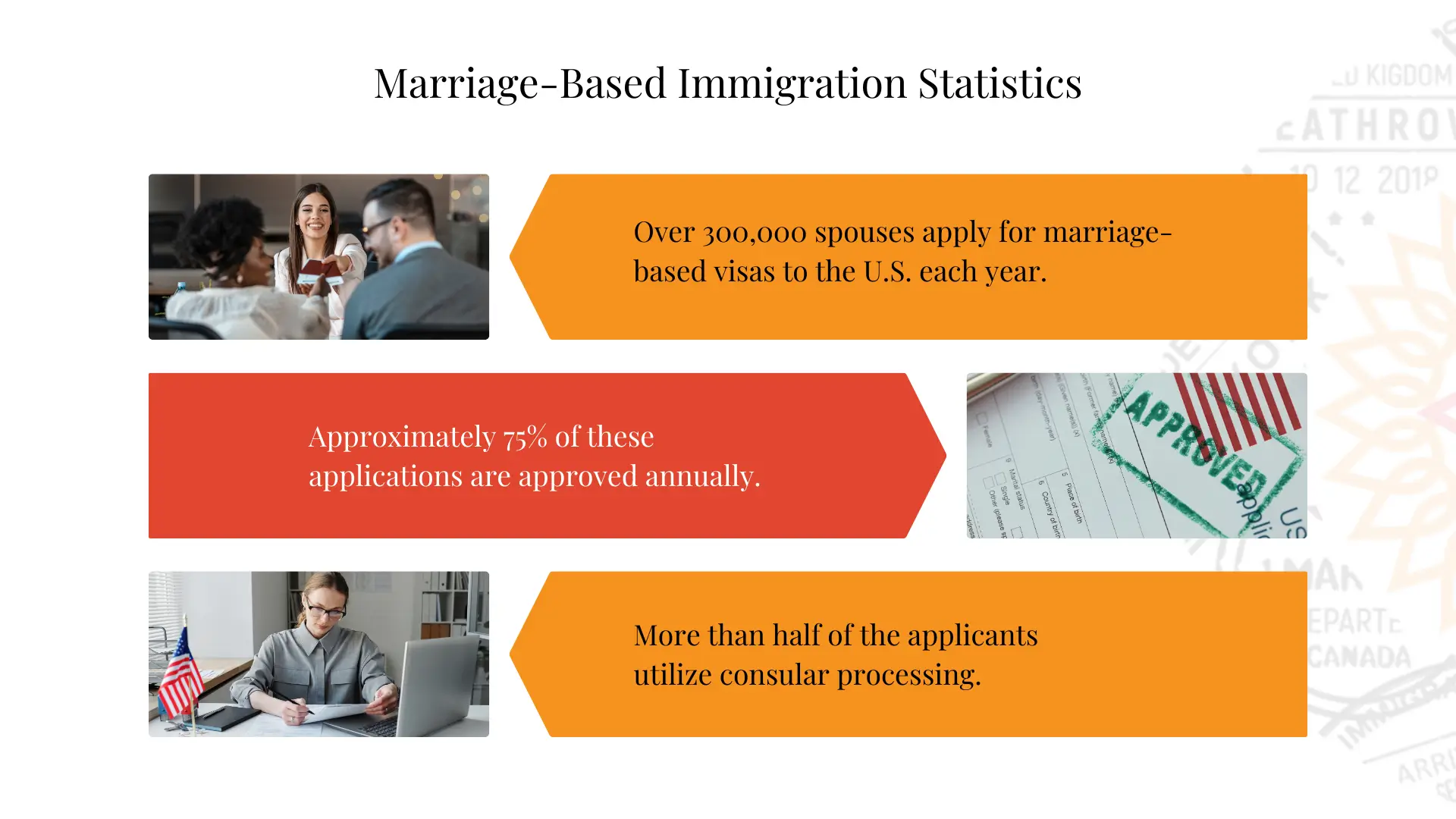U.S. Marriage Immigration Lawyer
Navigating the U.S. immigration process can be complex and overwhelming, and can drain your energy and your time, especially for marriage-based applications. If you do not have to, why would you try to figure out a marriage-based application instead of focusing on your marriage?
Here at Cambridge Immigration Law, we are dedicated to allowing you to live your life, enjoy your marriage, AND get a green card. To best serve you, we provide personalized guidance to help you and your spouse achieve your immigration and LIFE goals. Do not go down the path of your US immigration journey alone. Your errors result in delays, extra costs, and denials. As a team of experienced U.S. marriage immigration lawyers we will be by your side and that will make all the difference.
In this video, Ellen goes over clients’ top five queries regarding marriage-based green card. You need the answers to these questions before filing your marriage-based green card application. How long will this process take? Can we start working with you before you get married? What if you have a criminal record or immigration law violation? What do I need to have in my application? What happens if my application gets denied?
Have more questions? Contact us at Cambridge Immigration Law.

U.S. Marriage Immigration allows spouses of U.S. citizens and lawful permanent residents (LPRs) to obtain residency and eventually citizenship. The process varies depending on whether the applicant is already in the U.S. or applying from abroad.
For those seeking professional assistance, a U.S. marriage immigration lawyer can help navigate the legal process, ensuring all necessary documentation is correctly submitted and avoiding delays.
Marriage-Based Immigration to the United States
Marriage-based immigration allows U.S. citizens and lawful permanent residents (LPRs) to sponsor their foreign-born spouses for permanent residency. The process varies depending on whether the spouse is currently in the U.S. or abroad.
If your spouse is already in the United States, they may be eligible to apply for a Green Card through Adjustment of Status (AOS). This pathway enables them to remain in the country while their application is processed.
For spouses residing outside the United States, consular processing is the standard procedure.
Initiated by the U.S. citizen or LPR spouse to establish the qualifying relationship.
This can often be filed concurrently with Form I-130, especially if the sponsoring spouse is a U.S. citizen.
The applicant will provide fingerprints, photos, and signatures for background checks.
Both spouses attend an interview to verify the authenticity of the marriage.
If married for less than two years at the time of approval, a conditional Green Card valid for two years is issued. To remove conditions, file Form I-751 within the 90-day period before the card expires.
Submitted by the U.S. citizen or LPR spouse to establish the qualifying relationship.
Once approved, the case is transferred to the National Visa Center (NVC) for further processing.
Complete the DS-260 online immigrant visa application and gather necessary documents, including the Affidavit of Support (Form I-864).
The foreign spouse will be interviewed at the U.S. embassy or consulate in their country.
Upon approval, an immigrant visa is issued, allowing entry into the United States as a permanent resident. The physical Green Card will be mailed to the U.S. address provided.
If your spouse is already in the United States, they may be eligible to apply for a Green Card through Adjustment of Status (AOS). This pathway enables them to remain in the country while their application is processed.
Initiated by the U.S. citizen or LPR spouse to establish the qualifying relationship.
This can often be filed concurrently with Form I-130, especially if the sponsoring spouse is a U.S. citizen.
The applicant will provide fingerprints, photos, and signatures for background checks.
Both spouses attend an interview to verify the authenticity of the marriage.
If married for less than two years at the time of approval, a conditional Green Card valid for two years is issued. To remove conditions, file Form I-751 within the 90-day period before the card expires.
For spouses residing outside the United States, consular processing is the standard procedure.
Submitted by the U.S. citizen or LPR spouse to establish the qualifying relationship.
Once approved, the case is transferred to the National Visa Center (NVC) for further processing.
Complete the DS-260 online immigrant visa application and gather necessary documents, including the Affidavit of Support (Form I-864).
The foreign spouse will be interviewed at the U.S. embassy or consulate in their country.
Upon approval, an immigrant visa is issued, allowing entry into the United States as a permanent resident. The physical Green Card will be mailed to the U.S. address provided.
Why Legal Guidance is Essential
With frequent policy changes and increasing scrutiny in marriage-based immigration cases, attempting this process without legal counsel can lead to unnecessary delays or even denials. The current administration continues to adjust immigration policies, making it more challenging to navigate the system without an expert in U.S. marriage immigration law. At Cambridge Immigration Law, we stay up to date with all changes, ensuring that our clients’ applications meet the latest legal requirements. A U.S. marriage immigration lawyer can provide legal guidance throughout this process, ensuring all paperwork is completed correctly, deadlines are met, and the marriage is properly documented.
Special Considerations for Specific Groups

The U.S. recognizes same-sex marriages for immigration purposes. The application process mirrors that of opposite-sex couples. It’s essential to provide evidence of a bona fide marriage, such as joint financial records, cohabitation proof, and affidavits from friends and family.

Under the Cuban Adjustment Act, Cuban nationals and their spouses may be eligible for a streamlined path to permanent residency. After residing in the U.S. for one year, they can apply for a Green Card, even if they entered without inspection.

Spouses of U.S. military personnel may qualify for expedited processing and benefits like parole in place, allowing them to remain in the U.S. while adjusting their status. This consideration helps minimize family separation during deployments.
Frequently Asked Questions
Q: How long does the marriage-based Green Card process take?
Q: What if our marriage is less than two years old when the Green Card is approved?
You will receive a conditional Green Card valid for two years. To remove the conditions, file Form I-751 during the 90 days before its expiration, demonstrating that the marriage is genuine.
Q: Can I work while my Green Card application is pending?
Yes, applicants can apply for an Employment Authorization Document (EAD) when filing Form I-485, allowing them to work legally in the U.S. during the processing period.
Q: Are there any exceptions or expedited processes for military spouses?
Yes, military spouses may benefit from expedited processing and provisions like parole in place, which allows them to remain in the U.S. while adjusting status, reducing the risk of separation during deployments.


Embarking on the marriage-based immigration journey can be daunting, but you don’t have to face it alone. Ellen Sullivan, and her team of experienced U.S. immigration lawyers at Cambridge Immigration Law are committed to guiding you through each step, ensuring that your application is thorough and timely. Attempting this journey without experienced legal help can lead to unnecessary delays, rejections, and even making the process unobtainable. With shifting policies and strict regulations, expert legal support is more critical than ever.
Contact us today for a consultation, and let’s work together to achieve your immigration goals.